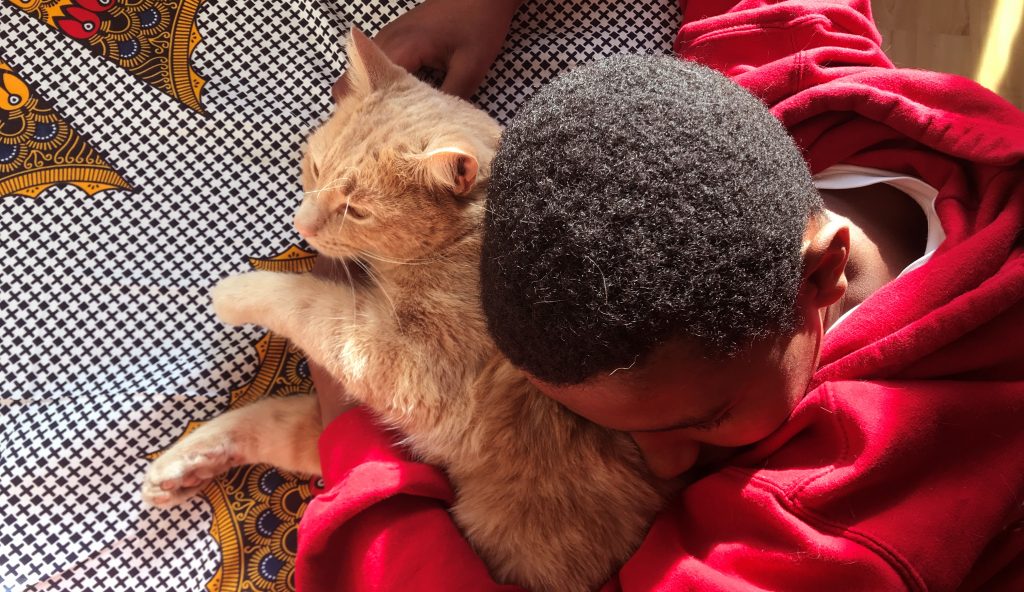Barber shop
Adopting a child of a different ethnicity raises the question of hair care. My son was adopted from Ethiopia and has jet black tight curly hair. My hair is that of a Caucasian person, straightish and dirty-blond in colour.

My son’s dense, thickly wound curls, are a magnet for attracting things: sand on a beach, grass from the park, and many a cat hair from burying his head into the cat’s fur. Twelve-years-old he loves to jump, dive, roll, header and kick balls. He plays indoor football with anything from a sock, a tennis ball, a cat toy, cork and ping -pong ball. Our neighbours endure the thud of the ball against the wall. Going upstairs for his shower at the end of day usually involves a dramatic face plant on the stairs, rolling over to play dead, he’s ‘too tired’ to get up by himself and ‘needs help’.
My son is tall and looks more like a seventeen-year-old, yet still needs me to stand outside the shower, in case a scary monster attacks. As the clock ticks closer to ‘lights-off’ he knows he has my full attention. After his hair is washed and conditioned, it’s so very soft and springy. He doesn’t particularly enjoy his hair being combed. I have to beg him to stay in one spot for me to comb it through. But when I do, it picks-out to a super soft puff which he loves to admire the height of, ‘look how long my hair is’ he remarks as his fingers gently pat each hair into place.
As a single white mother of a black child, I feel my skill set with his hair is under daily scrutiny. The children at his secondary school gleefully look for anything they can tease someone about. On days when my son hasn’t combed his hair and it’s particularly matted, I wonder what they will say. For the most part, they like teasing him about his top row of crooked teeth that stick out in every direction. His school is super strict about uniform and expression through accessories, jewellery, or makeup forbidden. So their hairstyles define them. Entering the school gate, those Afros are combed out to the max, hairs cut, shaved, braided, brushed and styled to perfection.
A few years ago during our first barbershop excursion to Clapham, the Ghanaian barber asked me, ‘Who are you to the child?’ I was so out of place and had to mention our Nigerian friend’s name to explain how I had found them. The barber asked if he had special needs (if he did it meant he could go first) otherwise we had to wait along with everyone else on the bench. We sat down and dutifully waited while the elders were served first. I felt everyone’s eyes on us and my son looked in the mirror and remarked ‘Mum I’m looking really pale’. He too was feeling too white but I chatted away to all and soon there were other distractions of kids playing in the shop and the regulars chatting away. I got hair advice from an African mother, who told me don’t use any products just water and a comb, as products can make the hair sticky and matted. My son left with a sharp cut, and a bounce in his step looking more African than ever.
The second barbershop we visited was West Indian, in Ladbroke Grove, used to mixed-race families, didn’t bat an eyelid when we walked in together. My son was happy that they had Star Wars on the TV and the barber was interested to know that we had both lived in the States.
During one of the Covid lockdowns, my son was brave enough to trust me with the clippers. His dark curls, cut like room temperature butter. I didn’t know what I was doing, it was too easy to push the clippers in and dig out a dent. So hard to create the perfect fade. He soon refused my offers to trim his hair.
After many months of letting his hair grow out. It was time for a trim. We discovered an East African barbershop a short cycle ride away, located next to an Ethiopian restaurant where we can eat shiro wat and injera following. On our first visit, the barbers were fascinated as to who I was, yet quick to piece the together that my son was adopted. They knew he was Ethiopian just by looking at his face and were disappointed that he didn’t speak Amharic. The all-male clientele watched while I stepped up too close to the chair, talking too much and taking photos of the progress on my iPhone, the only female in the shop. I was in the way. Afterwards my son said maybe it would be better if I didn’t go inside next time, but then he changed his mind and said I was needed to help explain the ‘Mbappe’ style haircut he wanted. As the haircuts of recent involve wearing a mask, he mumbles his words, so I still have a use!
I know it’s only a matter of time until he wants to go to the barbers solo. I cramp his style, but do love watching the barbershop interactions, the nods, handshakes, unsaid words that the male species are so good at. It’s like entering a portal into my son’s birth culture and I’m thankful that they allow us entry and are open to the fact we are a little different from their regular clientele.
Single adoptive mother, South West London
